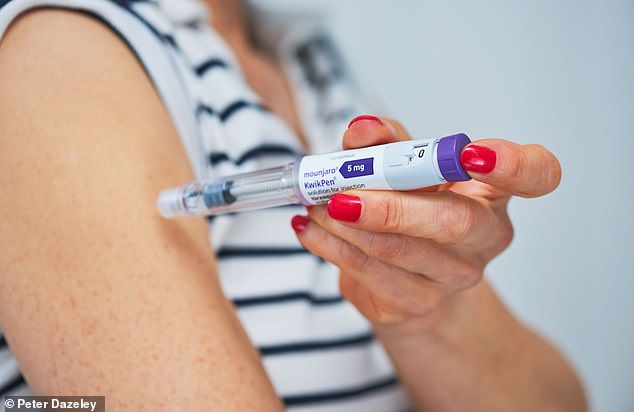Arthritis sufferers could get relief from their painful symptoms by using weight-loss jabs, a study has found.
Medications such as Mounjaro and Wegovy, which are prescribed to treat obesity and type 2 diabetes, have over the past few years been shown to dramatically reduce the risk of a range of diseases, including heart attack and stroke.
And now it appears that the drugs, known as GLP-1 agonists, can ease the painful symptoms of rheumatoid arthritis – a condition in which the immune system attacks healthy joint tissue, causing painful swelling.
A study published last week in the Journal of the American College of Rheumatology found patients given low doses of semaglutide or tirzepatide – the active ingredients in the drugs – reported significant reductions in pain.
‘There is now really good evidence these medicines can reduce inflammatory cells across the body,’ said Professor Andrew Cope, a rheumatology expert at King’s College London. ‘This study showed reduced pain in patients who were not particularly overweight, with a BMI around 27. Most patients in clinic are above this, so the effects on those who really struggle with weight could be even greater.
‘In rheumatoid arthritis, we know these drugs can block production of the specific cells that trigger flare-ups, much like current medicines – but they also have extra anti-inflammatory properties. They really are a wonder drug, in many ways.’

Experts say the findings could change the way that rheumatoid arthritis is treated.
Professor Cope added: ‘The use of these drugs will certainly expand, and they could offer us an opportunity to better personalise care for rheumatoid arthritis. While they will not replace current medications, used alongside them they could prove an effective tool.’
More than 1.3 million people in the UK have rheumatoid arthritis. The most common symptoms are joint pain, swelling and stiffness – typically in hands and feet. Many patients also experience fatigue, sweating and poor appetite.
Women are three times more likely to develop the condition than men, and it often runs in families.
There is currently no cure, but drugs are prescribed to control symptoms. Weight-loss jabs are not among them – however, some patients prescribed the injections for obesity are reporting dramatic improvements.
American mother-of-one Cassandra Smith, 30, says her life has been transformed by tirzepatide. The teacher was diagnosed with rheumatoid arthritis three years ago and would often be left bedbound by flare-ups.
‘Pain would start in my shoulders and slowly work its way down my body, sometimes taking three days before I could move again,’ she said.
Weighing more than 22 stone, Cassandra was told by her rheumatologist that losing weight was the best way to lessen symptoms. But after trying various diets programmes with no success, she was prescribed tirzepatide nine months ago.
‘Within three weeks tests showed my inflammation had returned to normal, and two weeks later all the pain was gone,’ she said. ‘I’ve gone from frequent flare-ups to not having one in months. It has changed my life.’
The biggest benefit is likely to be for patients with both rheumatoid arthritis and obesity. But under current NHS rules, they are not eligible for the jabs.
‘The proportion of patients we see in clinic with obesity is rising,’ said Professor James Galloway, a rheumatology researcher at King’s College London. ‘Around half would be considered obese. Current medicines are often less effective in these patients, partly because of the higher dose needed and the extra burden of weight.
‘Yet arthritis is not currently listed as a co-morbidity that allows access to these drugs on the NHS.’
NHS guidelines state patients must have a BMI over 40 and at least four other health conditions, such as heart disease or type 2 diabetes, to qualify for the jabs.
‘I think this will change, but we do need more research, which is ongoing,’ Professor Galloway said.
Dr Lucy Donaldson, director of research at the charity Versus Arthritis, urged caution. She said: ‘We are monitoring the research, but there is not yet enough evidence to know the effects of weight-loss injections, or how they interact with existing treatments.
‘This study is interesting but has limitations which make it hard to be certain of the direct contributions of GLP-1 agonists.
‘We recommend that anyone using, or considering using, weight-loss medications does so with the knowledge and support of their medical practitioner.
‘These drugs have side effects and risks and should only be taken under clinical supervision, alongside lifestyle changes such as a healthy diet and appropriate physical activity.’












